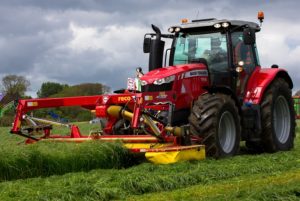 Farmers could get a huge amount more production from their grass – and Grassland UK can show them how.
Farmers could get a huge amount more production from their grass – and Grassland UK can show them how.
“Production from forage is not rising in the UK,” says Biotal’s Roy Eastlake, who will be speaking in the technical seminar programme. “Last year farmers averaged energy levels of 10.8MJ/kg DM in their grass silage and they could be getting so much more.”
With this in mind, Mr Eastlake will be detailing how to achieve high quality silage by taking multiple cuts at shorter intervals. “Typically there would be five to six week between first and second cuts, but with this the aim is for around four weeks which will achieve similar yields,” he explains. “The challenge is for growers to achieve energy densities of 11.5MJ/kg DM– it can be done.”
It’s been a difficult spring for livestock producers, many of whom are facing a shortage in forage. According to DLF’s Chris Gamble, short-term solutions may include reseeding, overseeding, or growing an arable silage crop undersown with grass.
However, selecting the right grass variety is an important part of any grazing system and Bill Reilly at Germinal will be going through which varieties are best suited to producing the best quality forage. “You want good quality cultivars in the ground, so that swards last. And they need to be managed correctly to achieve the optimal output, whether that’s for meat or milk.”
There’s a lot of talk about improving soils at both farm and government level – and doing so will improve forage quality and quantity, while offering environmental benefits and protection against extreme weather events. Topics being covered in the seminar programme include managing soil for good structure, new water regulations, and the benefits of grass leys for arable and mixed farms.
In addition, farmers can hear new thoughts on clamp design and catch up with the latest scientific understanding of grass and animal nutrition, beyond the usual NPK. With emphasis on cutting bagged fertiliser use to minimise costs, John Williams at ADAS will be discussing effective management of organic nutrients and manures. “It’s about maximising their value to the farm,” he says. “There’s not a farmer in the country who would put fertiliser in the spreader without knowing its nutrient values, so it should be the same for organic manures.” He suggests sampling manures and tailoring application timings to maximise efficiencies and minimise losses.
When it comes to business resilience and compliance, Piers Badnell at LIC wants farmers to look at costs a little differently. “People hear that they need to cut costs all the time, which is a bit stale. So it’s about looking at what are costs and what are investments,” he explains. “A key one is labour, which I would suggest is an investment. If you treat it as a cost you may find that getting suitable labour is difficult – but investing extra money in the right person can be good for your business down the line. It’s about looking at the word cost in a different way.”
Attendance at Grassland UK seminars will attract 2 BASIS CPD points for those who register. The register will be located in the seminars marquee in the trade stand field.
- Grassland UK 2018 takes place on Bridge Farm & Bagborough Farm, adjacent to the Bath & West Showground on Thursday 10 May from 9am to 4pm. Tickets cost £17 (£15 for students) in advance or £20 on the gate. For more information and to book tickets head to bathandwest.com.


